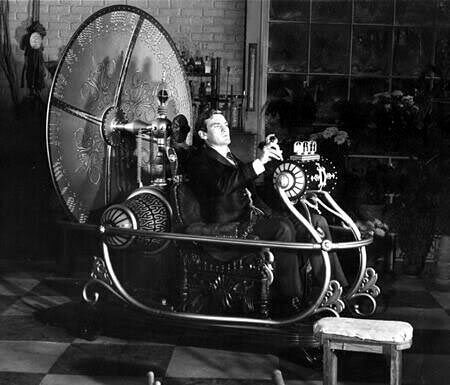I can’t help imagining some grouchy old-timer saying something like “Damn cave paintings. In my day, we told stories about the sacred mammoth hunt, and you really had to use your imagination. Kids these days just want to stare at a wall all night. No wonder they can’t throw a spear straight”.
The NY Times is asking what technology is doing to us, especially all these gadgets.
It isn't new. Last year Wired made the bold claim that Digital Overload Is Frying Our Brains. What really got this ball rolling seems to be credited to Nick Carr's 2008 piece in the Atlantic, in which he asked, "Is Google Making Us Stupid?"
Over the past few years I’ve had an uncomfortable sense that someone, or something, has been tinkering with my brain, remapping the neural circuitry, reprogramming the memory. My mind isn’t going—so far as I can tell—but it’s changing. I’m not thinking the way I used to think. I can feel it most strongly when I’m reading. Immersing myself in a book or a lengthy article used to be easy. My mind would get caught up in the narrative or the turns of the argument, and I’d spend hours strolling through long stretches of prose. That’s rarely the case anymore.To those familiar with the historical development of just about any new technology, fears about what each new step might be bringing are nothing new. As Quiggin notes, new technology brings with it new ways of doing things - and this inevitably means losing old ones. The trick is in assessing the cost/benefit ratio. However, because there is no way of knowing what the future really holds, attempts to prognosticate will always suffer - whether resulting in pessimism or optimism; we just don't know.
I'm reminded of James Burke's classic television series Connections. Here's the implications of the thermos flask:
So, obviously this doesn't mean we can't make informed predictions, or notice changes in society that are occurring around us. It simply suggests that there are often unforeseen consequences of technological innovation, and that we ought to be very careful not to get ahead of ourselves.
A commenter at Crooked Timber writes:
Socrates also IIRC was cranky about those young whippersnappers who think they can understand something by reading it, instead of memorizing it and actually holding in their heads where understanding happens. And if you base your knowledge on what you read, then of course you can flit from book to book, without the true discipline and concentration needed to study in an oral tradition.
Socrates was right, of course. If wisdom is based on what is in your head, then reading is pseudo-wisdom, a cheat. I prefer to think of it as off-site storage, and that reading is a way to access lots of information and ideas without having to keep them on-site. The Internet does the exact same thing, but it pumps the process up another couple of orders of magnitude.
I used to say that Aristotle was undoubtably smarter than I, but I plus the Columbia Encyclopedia know more than Aristotle. Today, I plus Wikipedia know way more than that, but the essential process is the same.
If you want to talk about how the Internet is changing the way we think, first look at how literacy changed the way people think.
I think that is well-put. I’d also add that when reading a book you’re also stuck in that author’s head. Now, this may be a marvelous place to be. But it can also be insidious. I’m thinking of the Stockholm syndrome, in which hostages develop false feelings of fealty towards their captors. One of the most marvelous aspects of reading the classics is the availability of annotation.
I’ve yet to read a book on one of these new-fangled e-readers, but the addition of subtle hyper-linking might be interesting. But then of course, if they’re created by the author you’re still in his grip. Maybe one day we’ll have open-sourced editions, whereby anyone can publish their own hyper-link annotations for a particular work.
In the meantime, having the computer handy is often just a brilliant reference tool. For instance, right now I’m reading Donald Worster’s biography of John Muir (which is excellent, by the way... and come to think of it, quite ironic) and I’ve popped over to Wikipedia more than once. I won't try to argue that the internet hasn't had a profound impact on the way we engage with media. But I think it is still much too early to say whether the bad outweighs the good, or that shifting attention spans is necessarily a bad thing.
Finally, and I feel guilty for waiting until the end to say this, but I'm afraid that, in the interest of full-disclosure, I must admit to having always had a horrifically short attention span. When Carr describes the uncomfortable feeling he gets as he realizes that becoming immersed in a novel is no longer as easy at is might have once been, my first thought is, "Welcome to Super Vidoqo's world." I realize that my own anecdotal experience may actually be clinical. But I know I've never been alone. And for those of us out here in la-la land, the internet presents a way to engage with media in a way that is certainly more satisfying, if not a net gain in intellectual development. Maybe it will turn out for the worse. But I, for one, am enjoying the ride.



